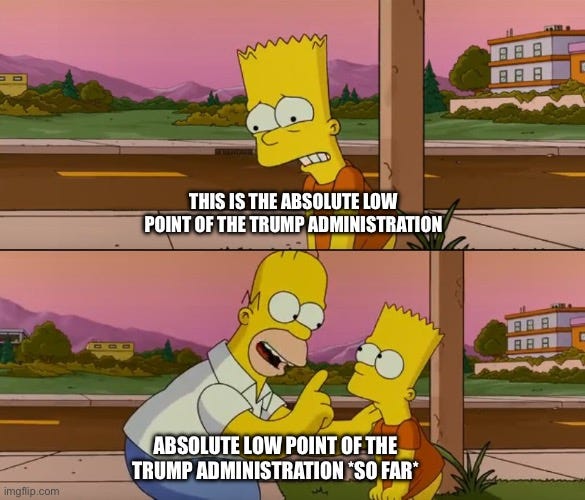Mutual Eh-sured Destruction
If it’s not too late (and it probably is) Canada should consider building its own nuclear deterrent.
Political scientist Stefan Dolgert, writing in the Ottawa Citizen, argues that the time has come for Canada to build its own nuclear weapons arsenal in response to Donald Trump’s increasingly hostile America:
To understand what it’s like being beside a bully in today’s world, look at Ukraine. Perhaps the greatest mistake that country made after the breakup of the USSR was to get rid of its nuclear weapons. The consequences? Russia seizes Crimea and effectively invades eastern Ukraine by arming Russian secessionists there. This could also happen to Latvia and the Baltic states.
Could it happen here? For more than a century, Canadian policy could assume that, while the U.S. might be an 800-lbs gorilla on our doorstep, at least the gorilla played by the rules. But Trump has said the old rules won’t apply, and his selection of white nationalists and conspiracy theorists to powerful roles in his administration indicates he is not kidding.
Most troublingly, recent Congressional Republican capitulation on “L’Affaire Russe” shows us that the famed “checks and balances” of the U.S. Constitution mean little, and that the path to American authoritarianism is wide open.
To plan for the day when the U.S. is more like Putin’s aggressive bear, Canada must be able to protect itself without anyone’s assistance. A conventional military buildup is nonsensical, given the size disparity between the U.S., Russia, and ourselves.
But as Israel, Pakistan and North Korea have shown, nuclear arms are a pragmatic deterrent for small nations adjacent to populous neighbours of uncertain motives.
Yes, this might provoke the ire of Trump or Putin, and hasten the conflict it means to stave off. That risk must be carefully weighed. But what do you think Ukraine would do, given the chance to go back and keep its nukes?
The National Post’s Tristin Hopper, meanwhile, notes that Canada has the capability to build its own nuclear weapons, though keeping the program secret would be almost impossible:
On the face of it, Canada has all the ingredients to become a nuclear-armed state: Ample uranium, plenty of engineering talent and a robust nuclear power sector. Ontario’s Bruce Nuclear Generating Station, in fact, is the world’s largest nuclear power plant.
What’s missing, though, are the facilities needed to make weapons-grade nuclear fuel, be that plutonium or enriched uranium.
John Luxat is the director of the Hamilton-based Centre for Advanced Nuclear Systems. He estimated that it would take “years” for Canada to develop the capability to build its own nuclear weapons.
“The knowledge Canada has acquired over the decades posy-WWII, while substantial, has always been focused on the commercial nuclear power arena, and really does not give us an advantage with respect to the resources and time required to establish nuclear weapons complexes,” he wrote in an email.
To enrich uranium, Canada would need to build extremely costly complexes of centrifuges requiring specialized materials, such as high-strength aluminum. By the mere act of purchasing such materials, Canada would immediately tip off the international community that it was up to something.
Rogue nations like North Korea or Iran have evaded this problem by simply acquiring materials illegally — and sealing off their borders to nuclear inspectors. Even then, said Luxat, “establishing such a facility takes many years.”
Canada would also have the option of building a facility to separate plutonium from its vast stores of spent nuclear fuel.
“Only 1% of the spent fuel is plutonium. So tons of spent fuel would have to be processed to get enough plutonium for a weapon,” said Leonard Spector with the Washington, DC-based James Martin Center for Nonproliferation Studies.
This too takes time, and it would similarly be hard to keep it a secret. As Spector noted, all spent nuclear fuel is monitored by the International Atomic Energy Agency.
In short, the only way Canada could develop a bomb in secret would be to somehow acquire rogue nuclear technology and operate it in secret. While this might be relatively simple for an isolated authoritarian state, it’s next to impossible for a democracy with extremely close defence ties to the United States.
Hopper foresees additional difficulties with Canada deciding to join the nuclear club: the United States has traditionally tried to discourage even friendly countries from building their own nuclear weapons (TIL that Sweden considered doing so in the sixties, but backed down under American pressure) and could impose trade barriers in response, or even have Canada expelled from NATO.
Which seems…kind of redundant with tariffs likely coming this week and yesterday’s disgrace strongly suggesting the American-led Western alliance isn’t long for this world.
Maybe I’m being too harsh, though, considering that Hopper wrote that piece in 2018. And the Stefan Dolgert Citizen article is from a year earlier.
In the early days of Trump’s first term, this kind of thing was just out-there speculative fantasy. In the early days of his second term, I find myself taking it seriously.
Alef Aeronautics is flying away with your money
Keep reading with a 7-day free trial
Subscribe to Rigid Thinking to keep reading this post and get 7 days of free access to the full post archives.






